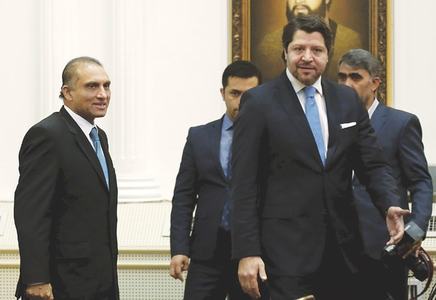ISLAMABAD: The Quadrilateral Coordination Group (QCG) on Afghan peace and reconciliation is expected to adopt a roadmap for peace talks when it meets today (Saturday). However, the formal start of dialogue between the Afghan government and Taliban still looks like it is months away.
This would be the third meeting of the group comprising officials from Pakistan, Afghanistan, US and China. The four countries agreed to work together last December on the sidelines of the Heart of Asia conference to revive the Afghan reconciliation process. The previous two meetings were held in Islamabad and Kabul in January.
The roadmap which is intended to guide the efforts of starting a peace dialogue between the Afghan government and militants was China’s idea. They insisted on a plan for the effort and documenting the process, said a source. “The roadmap is one thing that distinguishes this initiative from the process that started in Murree and was disrupted weeks later when it transpired that Mullah Omar was dead,” the source claimed.
Afghanistan proposed the draft of the roadmap at the first QCG meeting in Islamabad. Afghan Deputy Foreign Minister Hekmat Khalil Karzai, who is leading his side at the four-way talks, had said after the first round that the draft envisaged a three stage process – the pre-negotiation period, direct peace talks with Taliban groups and the implementation phase.
Pakistan gave its input on the draft later. The four countries have discussed the blueprint “section by section” and it is now at a point where it can be adopted. The plan is said to have evolved since the Afghan government made the initial proposal.
“There is almost an agreement on adopting the roadmap and moving forward. It is settled that it would be an Afghan-owned initiative, which would progress at a pace they desire,” said the source, adding that the roadmap would take the four countries to the beginning of the talks.
According to the source, it would be a three-phase roadmap, but interprets the stages differently from what Mr Karzai had initially said. He claimed that in the first stage the quadrilateral group would formulate a strategy on messaging the Taliban, ascertain which factions were interested in talking, and delineate the responsibilities of the partners and the action they would be required to take. In the second stage, he said, it would be decided as to how negotiations with the Taliban would be carried out and on what terms, including the confidence-building measures that the Afghan government would undertake. These two stages are expected to be completed by the end of March.
This would be followed by the third stage in which the Afghan government would extend a public invitation to the warring factions. “It may happen sometime in April, a bit earlier or later,” the source said, adding that the final stage would depend on the Taliban’s response to the dialogue offer and could be fine-tuned or modified.
Afghanistan Chief Executive Abdullah Abdullah had said in an interview with the press that the reconciliation dialogue could start in six months.
Some informal meetings between the Afghan government and Taliban factions could also happen before the direct talks begin.
Published in Dawn, February 6th, 2016













































